|
|
|
Sort Order |
|
|
|
Items / Page
|
|
|
|
|
|
|
| Srl | Item |
| 1 |
ID:
162503
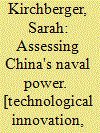

|
|
|
|
|
| Publication |
Heidelberg, Springer, 2015.
|
| Description |
xx, 318p.hbk
|
| Series |
Global Power Shift: Comparative Analysis and Perspectives
|
| Standard Number |
9783662471265
|
|
|
|
|
|
|
|
|
|
|
|
Copies: C:1/I:0,R:0,Q:0
Circulation
| Accession# | Call# | Current Location | Status | Policy | Location |
| 059559 | 359.00951/KIR 059559 | Main | On Shelf | General | |
|
|
|
|
| 2 |
ID:
163213


|
|
|
| 3 |
ID:
154580


|
|
|
|
|
| Summary/Abstract |
Since the establishment of diplomatic relations in 1951, Pakistan's desire for strategic parity with India and China's efforts to propel Pakistan as a strategic balancer to India have been the overarching factors for the emergence of a security centric Sino–Pak relationship. Over the years, it has diversified into an economic-centric relationship. Although military and technological transactions continue to dominate the economic relationship, China began gradually pledging increased investment in Pakistan's economy and infrastructure. China became the primary investor for building the Gwadar deep-sea port in 2002. Both sides signed a free trade agreement and agreed to link China's rail network to Gwadar Port through the Karakoram Highway in 2008. The commitment to develop Gwadar Port is a good indicator of the steady expansion of Chinese maritime interests and strategic influence in India's neighbourhood.
|
|
|
|
|
|
|
|
|
|
|
|
|
|
|
|
| 4 |
ID:
142802


|
|
|
|
|
| Summary/Abstract |
The days of Chinese double-digit growth are gone. Yet, the analytical separation of economic matters from strategic and military planning is both surprising and illogical. Beijing's capacity to continue building its military power is diminishing much faster than is commonly appreciated.
|
|
|
|
|
|
|
|
|
|
|
|
|
|
|
|
| 5 |
ID:
139368
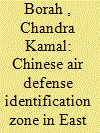

|
|
|
|
|
| Summary/Abstract |
The unilateral declaration of Air Defense Identification Zone (ADIZ) by the Chinese government and its enforcement from 23 November, 2013, 10 AM (Chinese time) has triggered a different kind of geopolitical scenario and geo-strategic consideration in Asia. The changing nature of geopolitics can be seen in terms of the reactions that the states have shown. This is perceived differently by other states, especially the rival forces as the symbolism of Chinese expansionism.
|
|
|
|
|
|
|
|
|
|
|
|
|
|
|
|
| 6 |
ID:
176638
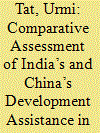

|
|
|
| 7 |
ID:
143834
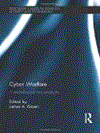

|
|
|
|
|
| Publication |
Oxon, Routledge, 2015.
|
| Description |
xiv, 182p.: ill., figures, tableshbk
|
| Series |
Routledge Studies in Conflict, Security and Technology
|
| Standard Number |
9781138793071
|
|
|
|
|
|
|
|
|
|
|
|
Copies: C:1/I:0,R:0,Q:0
Circulation
| Accession# | Call# | Current Location | Status | Policy | Location |
| 058477 | 355.4/GRE 058477 | Main | On Shelf | General | |
|
|
|
|
| 8 |
ID:
132140
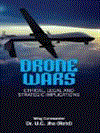

|
|
|
|
|
| Publication |
New Delhi, KW Publishers Pvt Ltd, 2014.
|
| Description |
xvii, 284p.Hbk
|
| Standard Number |
9789381904732
|
|
|
|
|
|
|
|
|
|
|
|
Copies: C:2/I:0,R:0,Q:0
Circulation
| Accession# | Call# | Current Location | Status | Policy | Location |
| 057806 | 623.7469073/JHA 057806 | Main | On Shelf | General | |
| 058631 | 623.7469073/JHA 058631 | Main | On Shelf | General | |
|
|
|
|
| 9 |
ID:
151124


|
|
|
|
|
| Summary/Abstract |
An idea and the reality encapsulating that idea have circular relation. Both follow each other and strengthen or weaken each other depending upon the level of congruence between the idea and reality. Though, survival of any new idea depends on this congruence, the idea has always a message and indicates a trend. The idea of ‘Indo-Pacific’ is a decade old, but it continues to evolve and strengthen as it represents a geo-strategic and geo-economic reality of our time. It replaced the notion of AtlanticPacific, which has been a dominant strategic framework with underlying political and economic significance for nearly half century after the end of cold war.
|
|
|
|
|
|
|
|
|
|
|
|
|
|
|
|
| 10 |
ID:
090051
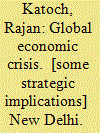

|
|
|
|
|
| Publication |
New Delhi, IDSA, 2009.
|
| Description |
26p.
|
| Series |
IDSA Occassional Paper No. 4
|
| Standard Number |
818601960X
|
|
|
|
|
|
|
|
|
|
|
|
Copies: C:2/I:0,R:0,Q:0
Circulation
| Accession# | Call# | Current Location | Status | Policy | Location |
| 054353 | 338.13/KAT 054353 | Main | On Shelf | General | |
| 054354 | 338.13/KAT 054354 | Main | On Shelf | General | |
|
|
|
|
| 11 |
ID:
193447
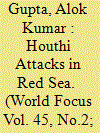

|
|
|
|
|
| Summary/Abstract |
The present events must not be read and understood in isolation or as an isolated instance. It has certainly given rise to a new geopolitical reality on the globe. US is still the net security provider on the globe and in different regions both on landas well as in maritime regions. On many occasions US has also demonstrated its the challenging position that it faces as a security provider owing to its close alliance with Israel. US have been quite smart in its response through retaliatory actions.
|
|
|
|
|
|
|
|
|
|
|
|
|
|
|
|
| 12 |
ID:
116216
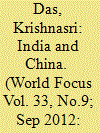

|
|
|
| 13 |
ID:
157334
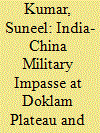

|
|
|
|
|
| Summary/Abstract |
To conclude, the military impasse was a result of China’s hegemonic and expansionist designs in Asia. China has territorial disputes with India. In recent times, has seen uncomfortable with strongly emerging strategic partnership of India with US and Japan. Its ambitions to reorder Asia hierarchically, while relegating position of India and Japan, is leading to its unilateral attempts to alter the status quo in the disputed territorial and maritime boundaries in South Asia, South East Asia and South China Sea.
|
|
|
|
|
|
|
|
|
|
|
|
|
|
|
|
| 14 |
ID:
140269


|
|
|
|
|
| Summary/Abstract |
The expansive use of armed unmanned combat aerial vehicles (UCAV), or ‘drones’, by the United States over the past decade has occurred within a particular strategic context characterized by irregular warfare operations in permissive environments. Ongoing strategic, ethical and moral debates regarding specific uses of drones may well be overtaken by a new generation of armed combat drones able to survive and operate in contested airspace with design elements such as stealth and greater levels of machine autonomy. These design parameters, and the likely strategic context within which second generation UCAVs will be deployed, suggest a fundamentally different set of missions from those performed by the current generation of drones. The most beneficial characteristic of current unmanned systems has been the ability to combine persistent surveillance with the delivery of small precision-guided munitions. With a shift to more contested environments, this type of armed surveillance mission may become less practical and second generation UCAVs will instead focus on high intensity warfare operations. These new systems may have significant implications for deterrence, force doctrine and the conduct of warfare.
|
|
|
|
|
|
|
|
|
|
|
|
|
|
|
|
| 15 |
ID:
185772
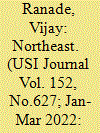

|
|
|
|
|
| Summary/Abstract |
The Northeast holds a treasure trove of natural energy sources in terms of hydel power and wind power and, to a lesser extent, solar power. It also has myriad other natural resources such as coal, tea, timber etc. None can be successfully processed to generate income and employment without power. In addition, the large hydel resources also generate enough power to export to the neighbouring countries and thus give strength to India’s ‘Act East’ Policy. To tap and exploit the full potential of the power sector in the region, we need a multi-pronged approach broken down into achievable phases which encompasses all the sectors of infrastructure, industry, financial outlay, and, importantly, aspirations of the region. Development of the hydro energy sector and especially the renewable power source will integrate the region not only with the national grid but also with South-East Asian countries. The abundance of hydro energy gives us an opportunity to look outwards. The article recommends the actions that must be taken and the road map for development of the power potential of the Northeast. This will also bring prosperity, douse the myriad militant movements, and integrate the region with the rest of the country.
|
|
|
|
|
|
|
|
|
|
|
|
|
|
|
|
| 16 |
ID:
131633
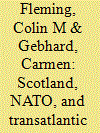

|
|
|
|
|
| Publication |
2014.
|
| Summary/Abstract |
This article explores the political and strategic implications of Scottish Independence for existing transatlantic security arrangements. It examines the potential institutional, legal and political obstacles Scotland might face during the transition to independence and discusses the specific challenges in the area of security and defence, including the nuclear issue and the question of what form an independent Scottish Defence Force (SDF) would need to take to allow and facilitate integration in transatlantic security structures. It argues that a number of strategic and political issues could be mitigated in the course of negotiations between Edinburgh and London. Moreover, Scotland's geostrategic position and political orientation make it an important prospective partner in international security cooperation across the Eastern Atlantic, High North and North Sea, which suggests that an advanced partnership with NATO, and eventually full membership, seems like an option that is both politically viable and more likely than any scenario that predicts seeing an independent Scotland (IS) outside these structures. This challenges some of the main strategic and security political arguments against independence and thus seeks to spark a debate about the realistic options for Scotland should it become independent after 2016.
|
|
|
|
|
|
|
|
|
|
|
|
|
|
|
|
| 17 |
ID:
134113


|
|
|
|
|
| Publication |
2014.
|
| Summary/Abstract |
This paper presents the strategic importance and implications of a truth commission in the context of South Africa. The limitations of a transitional democracy throw into relief the transitional circumstances of justice. A politically negotiated truth commission is a preferred mechanism, if not the most, for dealing with politically motivated crimes and human rights abuses. A truth commission builds on the concepts of transitional justice and transitional amnesty, thereby meshes with the concept of the rule of law. A truth commission, in its simultaneous and complementary role to retributive justice, can contribute in settling profound political and social conflicts in a country's history. The paper argues that a truth commission satisfies political, legal and ethical requirements simultaneously in a transitional setting. A truth commission can, to a great extent, resolve tensions between truth, justice and reconciliation and play an emancipator role towards democracy, although it can never guarantee truth, justice or reconciliation as they come up with a mixed package that includes a clear objective of ending violence, attending to social inequalities and individual and social readiness. This paper lays out many positive and negative aspects of a truth commission and suggests why a truth commission has increasing appeal. A truth commission may help to render truth, justice and reconciliation and can serve the causes of democracy as well.
|
|
|
|
|
|
|
|
|
|
|
|
|
|
|
|
| 18 |
ID:
176531
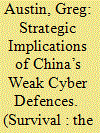

|
|
|
|
|
| Summary/Abstract |
China has far less incentive than the United States to conduct the sort of military campaign in which overall military success depends on success in cyber defence.
|
|
|
|
|
|
|
|
|
|
|
|
|
|
|
|
| 19 |
ID:
169292
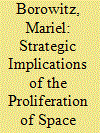

|
|
|
|
|
| Summary/Abstract |
Space situational awareness (SSA) refers to the ability to monitor and understand the state of the space environment, including the ability to track, understand, and predict the location of human-generated and natural objects in orbit around the Earth. This capability is a critical element in attributing and deterring attacks against space assets and in avoiding unintentional collisions. Historically, the United States Department of Defense has operated the most extensive SSA system in the world. Although, in recent years, it has shared data with commercial and foreign users on an ad hoc basis to help avoid collisions, access to the full database is highly restricted. Other nations, including Russia and Europe, have begun to develop or expand independent SSA systems. A number of commercial entities have also begun operating in this area, selling or planning to sell SSA services to satellite operators and governments. There are concerns in the United States about whether this proliferation of SSA technology and information will adversely affect national security, and questions about how the United States should respond to this situation. This article uses the example of remote sensing satellite technology and information, which experienced a similar transition from U.S. and Soviet dominance to participation by a wider range of nations and commercial entities, to identify the key strategic risks and opportunities posed by this trend. I discuss the extent to which these strategic risks and opportunities apply to the proliferation of SSA technology and information, finding that while the same strategic concerns are relevant in this case, typically the risks are lower. There are significant opportunities for the United States to benefit from this proliferation of technology. The article discusses the implications of these findings and offers recommendations that will allow the United States to further decrease the strategic risks associated with this trend, while increasing the benefits.
|
|
|
|
|
|
|
|
|
|
|
|
|
|
|
|
| 20 |
ID:
074612


|
|
|
|
|
|
|
|